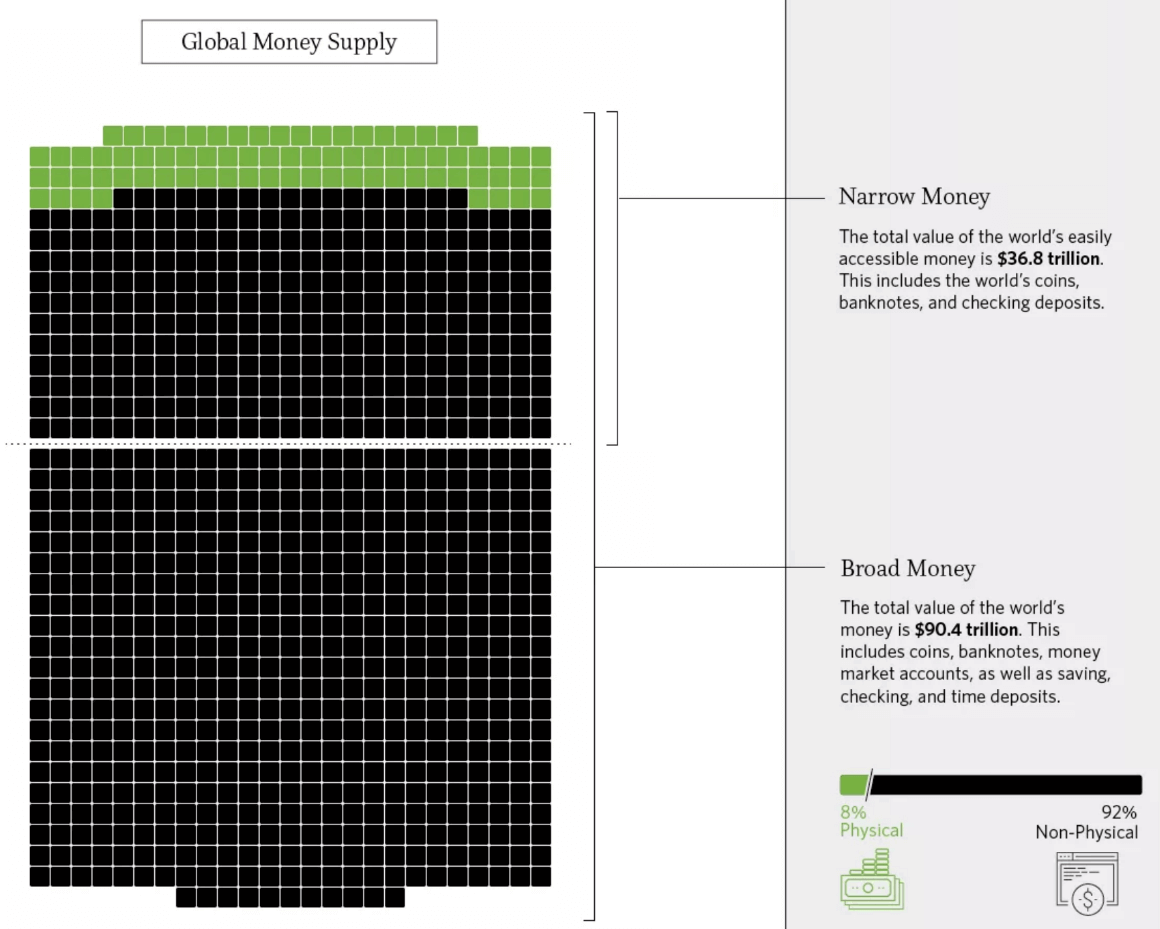This article takes a look at whether cryptocurrencies represents a new asset class for institutional investors. Is it time for the big players to enter?

The eye-popping returns generated by cryptocurrencies eclipses the returns of other investment classes such as stocks or real estate. But, adding up the sheer volatility of cryptocurrencies with liquidity issues facing this infant and unregulated market, it does not take long to figure out why institutional players do not see cryptocurrencies as a serious contender for an investable asset class. A deeper dive, however, uncovers the possible merits of cryptocurrencies that may beget a change in perception.
The entire cryptocurrency market grew exponentially from a market capitalization of $17.7 billion at the start of 2017, to $800 billion in 2018, recording a sterling 4,500% growth in just one year. In fact, a comparison of the gains recorded by cryptocurrencies in a single year shock anyone. The eye-popping returns generated by cryptocurrencies eclipses the returns of other investment classes such as stocks or real estate. But are institutional investors jumping on this bandwagon? (See also: 4 Reasons Why Now is the Best Time for You to Invest in Cryptocurrencies)
A Disruptive Technology
Blockchain – the technology underpinning Bitcoin and a majority of other cryptocurrencies – has the potential to disrupt a number of industries. Essentially a transparent, decentralized database, Blockchain technology is inherently secure and all transactions are immutable. While possibly revolutionary from a technological standpoint, some argue that that the conception of cryptocurrencies serves a deeper ideological purpose. Early adopters of cryptocurrencies were attracted to its nature of decentralization, as it represented a viable alternative to the traditional monetary system. Decentralization meant empowerment for the masses, and blockchain was the mechanism that ensures transparency, accountability and fairness; traits which were thought to be compromised in a centralized monetary system.
There are also many that thought of the cryptocurrency market as a speculative bubble, a gambling den of sorts where investors can make a killing or lose everything. Adding up the sheer volatility of cryptocurrencies with liquidity issues facing this infant and unregulated market, it does not take long to figure out why institutional players do not see cryptocurrencies as a serious contender for an investable asset class. Although the perceived risks seem to be unfathomable for institutional investors to consider, it is important for us to have a deeper dive to uncover the possible merits of cryptocurrencies that may beget a change in perception.
(See also: Understanding Cryptocurrencies: Game of Thrones Edition)
Volatility: The Wild West

The wild fluctuations of the cryptocurrency market are well known, and the recent correction is a testament to that. In the first week of 2018, the total market capitalization reached an all-time high surpassing $800 billion. A few weeks later, there was a bloodbath leading to a sharp drop of all cryptocurrencies across the board. From a high of $800 billion to less than $300 billion in a matter of weeks; that’s more than a 60% reduction in value!
With all that said, some players view this volatility as a great opportunity. Deutsche Bank global financial strategists Masao Muraki, Hiroshi Torii, and Tao Xu mentioned that:
“Although institutional investors recognize that stocks and other asset valuations may have entered bubble territory (US equities’ average P/E is around 20x), they cannot help but continue their risk-taking. Now, a growing number of institutional investors are watching cryptocurrencies as the frontier of risk-taking to evaluate the sustainability of asset prices.”
Quantifying Value of Cryptocurrencies
It is nearly impossible to determine an accurate valuation for cryptocurrencies There are no financial statements or cash flow metrics that investors can analyze using traditional equity and bond valuation techniques. The absence of a valuation framework makes cryptocurrencies unsuitable as an asset class in the perspective of a great portion of the institutional audience. (Read more: Crypto ICO vs. Stock IPO: What’s the Difference?)
However, there are certain characteristics of cryptocurrencies that may substantiate their value. They include:
- Utility: This refers to the use case or function of the coin. Utility is often correlated with a coin’s value, since it incentivizes people to invest and hold on to them. In the case of Bitcoin, it’s main utility as a peer-to-peer medium of exchange allows users to circumvent excessive banking (or any third party) fees and significantly reduce transaction times. So essentially, Bitcoin allows you to engage in a borderless transfer of value at a fraction of the cost and time. A higher rate of adoption entails a higher Bitcoin value since there will be a fixed supply of Bitcoin ever existing. It is important to differentiate between a coin and token, as they are often used interchangeably and there are different sets of utilities for each.
- Scarcity: The majority of cryptocurrencies are designed with a fixed supply schedule. This means cryptocurrencies are deflationary in nature, as compared to the inflationary disposition of fiat money whereby governments can print money contingent on their economic objectives. Economic principles dictate that a fixed supply of an asset coupled with an increasing demand for it will lead to a rise in the asset’s value. Due to the fixed supply of cryptocurrencies in general, they have often been considered a good store of value.
A simple methodology of approaching the valuation of Bitcoin – the “founding father” of cryptocurrency and certainly the largest – would be to compare the current supply of fiat money globally with Bitcoin. The total value of the world’s money supply (including coins, banknotes, money market accounts, time deposits and savings/current accounts) comes out to $90.4 trillion.

Source: The Money Project
Now, if Bitcoin were to form only 15% of that valuation, it’s value would come up to $13.56 trillion. Assuming all of the 21 million Bitcoin (fixed number of Bitcoin that will ever exist) have been minted, that works out to around $ 619,047 for each Bitcoin! Today’s prices would be a bargain.
Opportunities for Institutional Investors
At an early stage of technological progress, some institutional money has already been flowing into the cryptocurrency scene. Mike Novogratz – a billionaire hedge fund manager that started a $500 million hedge fund focused on cryptocurrencies – has confirmed the trend, stating:
“The institutionalization of this space is coming. It’s coming pretty quick.”
Even exchanges have been preparing for the flow of institutional money, with Coinbase announcing the launch of a cryptocurrency asset management service specifically for institutional investors. On a recent survey of institutional investors by Triad Securities, 62% of institutional investors are buying or are considering buying Bitcoin. That is a testament to the growing institutional appetite, and it looks to be exponentially expanding. With 2017 witnessing a slew of cryptocurrency hedge funds being incorporated, we can expect a major boost in the overall market capitalization of digital currencies in the coming year.
Beneficial Resources
If you're starting your journey into the complex world of cryptocurrencies, here's a list of useful resources and guides that will get you on your way:
Trading & Exchange
- Crypto Guide 101: Choosing The Best Cryptocurrency Exchange
- Guide to Bittrex Exchange: How to Trade on Bittrex
- Guide to Binance Exchange: How to Open Binance Account and What You Should Know
- Guide to Etherdelta Exchange: How to Trade on Etherdelta
Wallets
- Guide to Cryptocurrency Wallets: Why Do You Need Wallets?
- Guide to Cryptocurrency Wallets: Opening a Bitcoin Wallet
- Guide to Cryptocurrency Wallets: Opening a MyEtherWallet (MEW)
Read also: A Guide To Fundamental Analysis For Cryptocurrencies and Cryptocurrency Trading: Understanding Cryptocurrency Trading Pairs & How it Works
This represents the writer’s personal opinions and does not – in any way- constitute a recommendation of an investment or financial advice. Please assume caution when investing in cryptocurrencies and do so at your own risk, as it is extremely volatile and you can lose your money.
Get our exclusive e-book which will guide you on the step-by-step process to get started with making money via Cryptocurrency investments!
You can also join our Facebook group at Master The Crypto: Advanced Cryptocurrency Knowledge to ask any questions regarding cryptos!

I'm Aziz, a seasoned cryptocurrency trader who's really passionate about 2 things; #1) the awesome-revolutionary blockchain technology underlying crypto and #2) helping make bitcoin great ‘again'!

